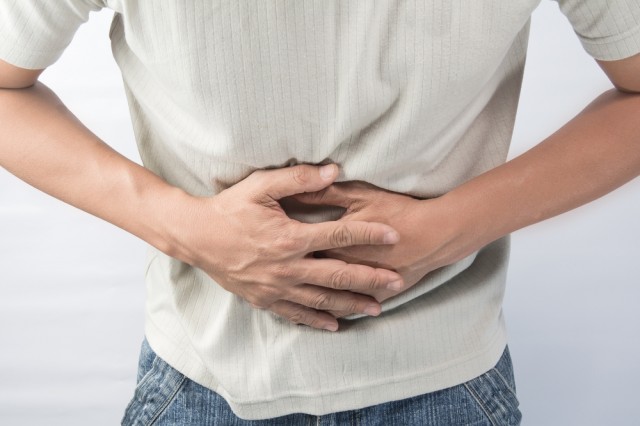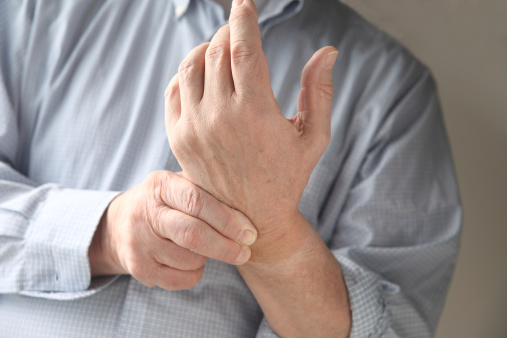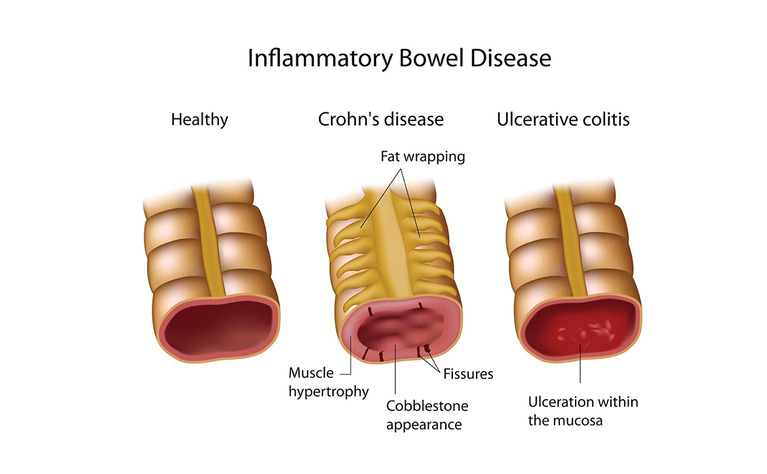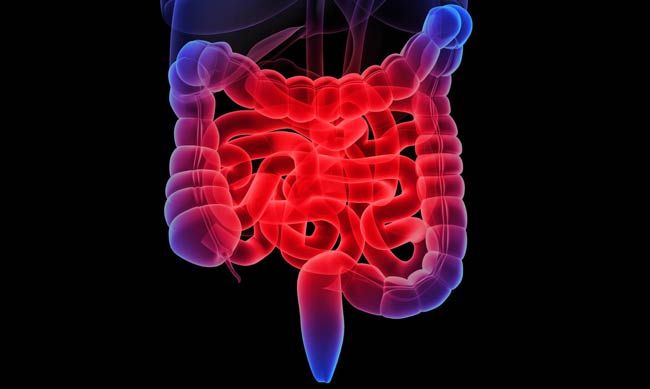Inflammatory bowel disease (IBD) is an umbrella term for intestinal disorders in which the digestive tract becomes chronically inflamed. The two major types of IBD include Ulcerative Colitis and Crohn’s disease. Ulcerative colitis leads to long-term inflammation and ulcers in the innermost lining of colon and rectum. In Crohn’s disease, the lining of digestive tract becomes inflamed and spreads deep into the affected tissues.
This condition can be very painful and troublesome. And in certain cases, it can even become life-threatening. In case of severe inflammation, the disease is said to be active and the sufferer experiences a flare-up of symptoms. In case of little to no inflammation, the disease is considered to be in remission and the person usually does not experience symptoms.
Read on here to know the symptoms, causes, complications, diagnosis and treatment of IBD.
Causes of Inflammatory Bowel Disease

The exact cause of inflammatory bowel disease is not known. Immune system malfunction is a possible cause of IBD. When your immune system tries fighting off an invading virus or bacteria, an abnormal immune response cause the system to attack cells in digestive tract as well.
Here are some of the risk factors:
-
Family history: If any of your family member has IBD, you are more likely to have it.
-
Age: Most of the people with IBD are diagnosed before 30 years of age but some do not develop it before 50-60 years of age.
-
Nonsteroidal anti-inflammatory drugs (NSAIDs): These meds increase risk of developing the disease or aggravate the condition in people already having it.
-
Smoking: Cigarette smoking is one of the most important controllable risk factor for development of Crohn’s disease.
-
Place of living: Someone living in an industrialized country is more likely to develop it. So environmental factors including diet and climate play a crucial role.
Signs & Symptoms of This Condition

Just like other chronic diseases, a person suffering from IBD usually experiences flare-ups periodically and symptoms are caused. This is followed by decrease or disappearance of symptoms and health is regained. The symptoms range from mild to severe and usually depend on the part of intestinal tract that is involved.
The common signs and symptoms include:
- Fever
- Appetite loss
- Weight loss
- Abdominal cramps and pain
- Diarrhea that may be bloody
- Iron deficiency, anemia due to blood loss
- Severe urgency to have a bowel movement
Does IBD Have Any Complications?

The two types of IBD (Ulcerative colitis and Crohn's disease) have some common complications. The complications found in both the conditions include:
-
Skin, eye and joint inflammation: Certain disorders such as arthritis, skin lesions and eye inflammation (uveitis) may occur at the time of IBD flare-ups.
-
Colon cancer: General colon cancer screening guidelines for people who don’t have IBD requires a colonoscopy every 10 years from the age of 50. Consult with doctor if you need this test sooner or on a frequent basis.
-
Blood clots: The risk of blood clots increases in arteries and veins with IBD.
-
Primary sclerosing cholangitis (PSC): In this condition, the inflammation causes scars inside the bile ducts, make them narrow eventually and cause gradual liver damage.
Diagnosing IBD

For the diagnosis of IBD, the doctor enquires about the medical history of your family and your bowel movements. A physical examination may be followed by one or more diagnostic tests.
Stool sample and blood test
Both these tests can be used for checking infections and other diseases. The blood tests can sometimes help in distinguishing between ulcerative colitis and Crohn’s disease. However, blood tests are not sufficient enough for diagnosis of IBD.
Plain film or X-ray
A plain abdominal X-ray is used in emergency cases where there’s possibility of intestine rupture.
Computer tomography (CT) and magnetic resonance imaging (MRI) scans
CT scans provide a detailed image of small intestine and also help in detecting complications of IBD. Safer than X-rays, MRIs make use of magnetic fields for forming images of body especially for examining soft tissues and detecting fistulas. Both MRIs and CT scans can be used for determining as to what part of intestine has been affected by IBD.
Flexible sigmoidoscopy and colonoscopy
Both of these procedures make use of camera on the end of a thin, flexible probe for looking at the colon. It helps doctor in checking ulcers, fistulas and other damage. While a colonoscopy can help in examining the whole length of large intestine, a sigmoidoscopy examines only the last 20 inches of the large intestine ‘the sigmoid colon’.
In both the procedures, a small sample of the bowel wall is taken sometimes. This is called a biopsy. By examining this biopsy under the microscope, IBD can be diagnosed.
Capsule endoscopy
This test examines the small intestine whose examination is harder than the large intestine. A small capsule containing the camera is to be swallowed in the test. During its movement in the small intestine, it takes pictures. After the camera passes through the stool, the pictures can be seen on computer. This test is used only when no other test helps in finding the cause of Crohn’s disease symptoms.
How Can It Be Treated?

The IBD treatment aims to reduce the inflammation triggering the symptoms. It may result in symptom relief, long-term remission and lowered risks of complications. The treatment usually involves lifestyle changes, drug therapy or surgery.
-
Anti-inflammatory drugs often happen to be first step for treating IBD. These drugs reduce inflammation of the digestive tract. These include sulfasalazine, its byproducts and corticosteroids.
-
Immunosuppressants or immunomodulators can help in preventing the immune system from attacking the bowel and leading to inflammation. This includes drugs that help in blocking TNF (a chemical produced by the immune system that causes inflammation).
-
Antibiotics are used for killing the bacteria that may be triggering or worsening the IBD symptoms.
-
Antidiarrheal drugs and laxatives are also useful in treating IBD symptoms.
-
Lifestyle choices are crucial in people affected by IBD. By drinking lot of fluids, you can compensate for the fluids lost during your stool. Avoid dairy products and stressful situations to improve the symptoms. Exercise and stopping smoking further improves your health.
-
Vitamin and mineral supplements help in satisfying nutritional deficiencies like anemia can be treated with iron supplements.
-
Surgeries are also carried out in certain people with IBD. Some of the IBD surgeries are strictureplasty (widening of narrowed bowel), colectomy (removing affected part of colon), ileostomy (diverting part of ileum to an artificial opening in the abdominal wall), proctocolectomy (removing rectum and affected part of colon), ileocaecal resection, permanent or temporary colostomy (diverting colon to an to an artificial opening in the abdominal wall) and others.

